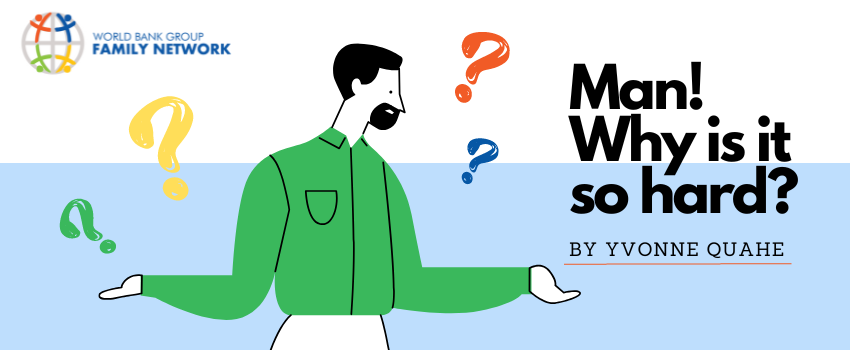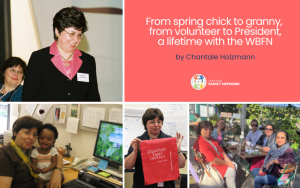
- Loss of economic independence. The loss of the breadwinner role results in a loss of economic independence. With his wife as the breadwinner, the man has to depend on her financially. This role reversal is hard to adjust to, especially if he has left a good job to join his spouse on this journey of being globally mobile. One male spouse described his experience as “a total systems crash”; another described himself as ‘feeling like a hunter locked in a cage and all the usual keys don’t work.” Research shows that the employees see their salary as “family money”. It is the non-working spouses that feels the economic dependence more acutely.
- Loss of identity. The accompanying spouse is a dependent of the employee, as everything is tied to the employee’s contract. This is the case with WBG spouses, work authorization, medical benefits, and much more are linked to the employee’s contract with the World Bank Group. Through this new dependency status, the male accompanying spouse can find it difficult to come to terms with his loss of identity as an employee prior to this move. This situation amplifies the financial dependency.
- Loss of social support structures. The male accompanying spouse had established social support structures in place covering his friends, colleagues, and family. Often when relocating, the family only has each other for support. To make matters worse, many of the expatriate support structures cater to the needs of the female accompanying spouse, who still make up 70% of the globally mobile spouses.
- Anxiety about establishing their career in new location. Organizations, still have a breadwinner mindset. They do not yet appreciate that men may choose to give their spouse the opportunity to pursue their career. If a woman has a break in her resume, to have children or follow her husband on an overseas assignment, that is generally understood and accepted. But a similar break in a man’s resume often raises eyebrows and doubts about his capabilities.
Given all these challenges, the male accompanying spouse feels added pressure to find work as soon as possible. Clearly, the journey of the male accompanying spouse is hard. So what can you do?
Anticipate the challenges ahead the best you can: Research data shows that career-oriented spouses needed a new strong personal identity to replace their professional one. The higher the status and economic reimbursement of the career that was interrupted, the greater the adjustment when this is lost. It is true for both men and women. But women have the advantage of having the traditional roles of caregiver and nurturer to grow into, whereas men have to carve a new identity as cultural and social norms expect them to be breadwinners. Think about how you can create a new identity which is not dependent on your profession. For example, in one of the case studies I conducted, the interviewees shared that one the keys to their success was that in every location, her spouse established himself in the new location by joining a sports activity and training to compete at a high level.
Find a new support network: For many male spouses, this shift in gender roles has put them in a vulnerable position, as they struggle with feelings of powerlessness, despair, isolation. For others, this drastic role reversal in their relationships is not something that had been anticipated, and is outside of their cultural norms. WBGFN has seen a 10% rising in our male spouse membership, so call us and we can connect you with others on a similar journey.
Keep the communication lines open with your partner: For most male accompanying spouses, this shift in gender roles is not easily accepted, creating tensions in the home even if the decision to move was made jointly. These experiences have been described as “emotional roller coasters”, with some men even finding it difficult to share their pain with their staff spouses. The reality of the change is often underestimated.
Final Comment
This shift in gender roles is challenging for many men to accept. The loss of economic independence, identity, and support structures had a greater impact than anticipated for many. This can create conflict in the family and contribute to added levels of stress as the employee is trying to adjust to a new work position, while also trying to support their husbands.
If you are facing this situation, please take heart. First, you are not alone in this experience. Second, you can take the steps above to help you deal with the challenge. And third, the first assignment is always the most difficult. Adjustment, especially psychological adjustment, takes time and effort, self-awareness and support. WBGFN and its members are here to provide support, especially through the Virtual Career Lab.






